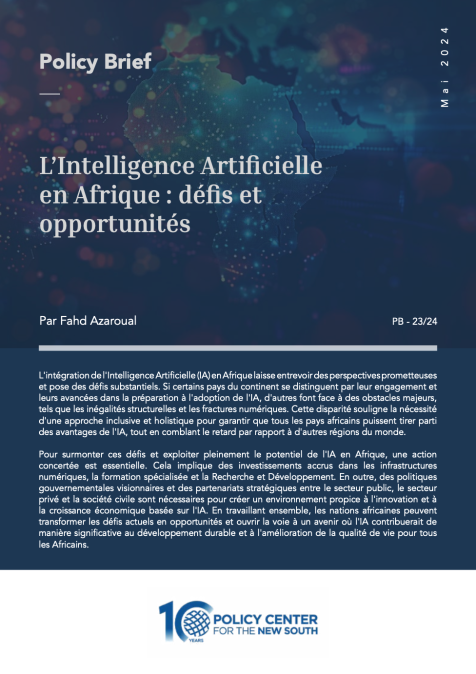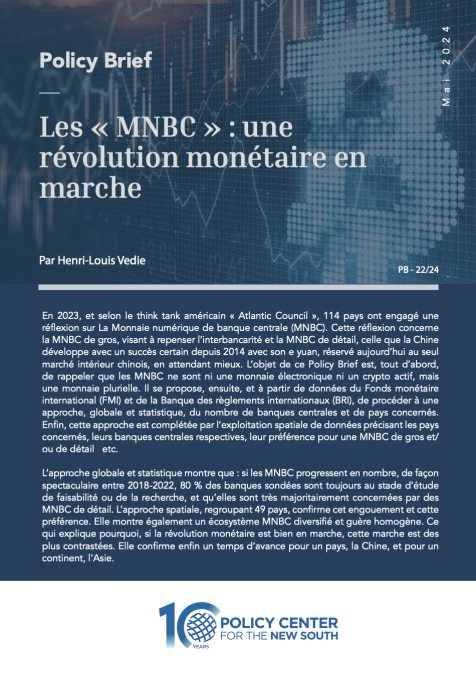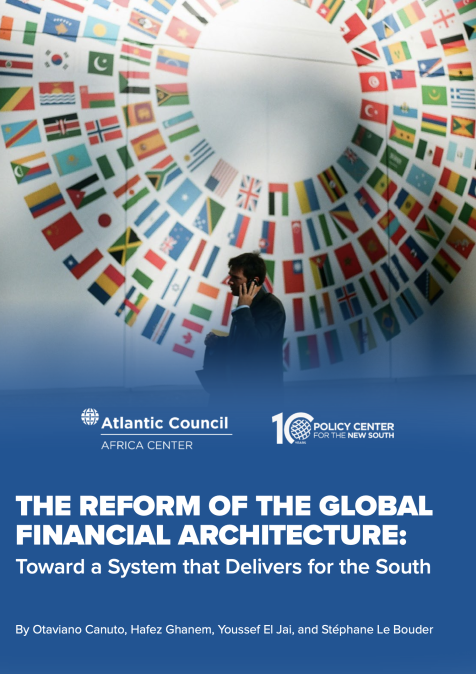Président
- Nobumitsu Hayashi, Gouverneur, Banque japonaise pour la coopération internationale (JBIC)
Présentateur
- Rajat Nag, Distinguished Fellow, Emerging Markets Forum (EMF)
Discutants
- María Eugenia Brizuela de Avila, Directrice, Inversiones Vision
- Larabi Jaïdi, Senior Fellow, Policy Center for the New South (PCNS)
- Abdoulie Janneh, directeur exécutif et membre du conseil d'administration, Fondation Mo Ibrahim
- Djoomart Otorbaev, ancien premier ministre du Kirghizstan
- Sommai Phasee, président de l'Association thaïlandaise du marché obligataire
Lancement de la dernière publication de la FEM : "From Here to Denmark ...the importance of institutions for good governance" par Rajat Nag et Harinder Kohli
RELATED CONTENT
-
AuthorsMay 16, 2024L'intégration de l'Intelligence Artificielle (IA) en Afrique laisse entrevoir des perspectives prometteuses et pose des défis substantiels. Si certains pays du continent se distinguent par leur engagement et leurs avancées dans la préparation à l'adoption de l'IA, d'autres font face à des obstacles majeurs, tels que les inégalités structurelles et les fractures numériques. Cette disparité souligne la nécessité d'une approche inclusive et holistique pour garantir que tous ...
-
AuthorsMay 15, 2024En 2023, et selon le think tank américain « Atlantic Council », 114 pays ont engagé une réflexion sur La Monnaie numérique de banque centrale (MNBC). Cette réflexion concerne la MNBC de gros, visant à repenser l’interbancarité et la MNBC de détail, celle que la Chine développe avec un succès certain depuis 2014 avec son e yuan, réservé aujourd’hui au seul marché intérieur chinois, en attendant mieux. L’objet de ce Policy Brief est, tout d’abord, de rappeler que les MNB ...
-
AuthorsMay 14, 2024As the African Continental Free Trade Area (AfCFTA) enters its fifth year, the rules of origin for trade in goods are still being finalised, but the institutional architecture is nearly complete with increased capacity, technical committees and new supporting instruments. Despite this progress in AfCFTA ‘policy supply’, meaningful trade under the AfCFTA is still to begin. For this to happen, there must be ‘policy demand’ from the private sector to use the agreement’s range of protoc ...
-
AuthorsAbdelkhalek TouhamiDorothee BoccanfusoMay 9, 2024L'idée d'un effritement de la classe moyenne marocaine est répandue, suggérant un glissement vers une classe aisée toujours plus riche et des classes plus pauvres ce qui sous-entend une augmentation de la polarisation dans la société. Cependant, aucune étude basée sur des données n'a été menée pour confirmer cette perception. Notre étude comble ce vide en analysant l'évolution de la classe moyenne entre 2012 et 2019. En utilisant la définition opérationnelle de Abdelkhalek (2014) de ...
-
 AuthorsMay 6, 2024The issue of environmental degradation represents a significant global challenge. It manifests in various forms, including physical alterations such as air pollution, ozone depletion, climate change, marine pollution and biodiversity loss. These changes are proven to be linked to human activities, such as energy production and consumption, tourism and agriculture. Additionally, factors like population growth and health and safety concerns contribute to environmental decline. Is Gro ...
AuthorsMay 6, 2024The issue of environmental degradation represents a significant global challenge. It manifests in various forms, including physical alterations such as air pollution, ozone depletion, climate change, marine pollution and biodiversity loss. These changes are proven to be linked to human activities, such as energy production and consumption, tourism and agriculture. Additionally, factors like population growth and health and safety concerns contribute to environmental decline. Is Gro ... -
 AuthorsMay 2, 2024This article was originally published on tandfonline.com This article explores the intricate relationship between economic growth and unemployment across multiple African countries, with a focus on estimating the Okun’s coefficient. Data from the International Labour Office (ILO) and the World Bank’s databases for 39 African nations were utilised. Two distinct methodological approaches, first differences and the Hodrick-Prescott (HP) filter, were employed to assess result robust ...
AuthorsMay 2, 2024This article was originally published on tandfonline.com This article explores the intricate relationship between economic growth and unemployment across multiple African countries, with a focus on estimating the Okun’s coefficient. Data from the International Labour Office (ILO) and the World Bank’s databases for 39 African nations were utilised. Two distinct methodological approaches, first differences and the Hodrick-Prescott (HP) filter, were employed to assess result robust ... -
AuthorsInacio F. AraujoApril 30, 2024This paper aims to quantify the economic loss from the earthquake that hit Morocco on September 8, 2023, and to evaluate the impact of the five-year reconstruction plan, that will account for roughly 8.5% of GDP. Given the geographically concentrated location of the earthquake, which hit some provinces in the central part of Morocco, the methodology used relies on an inter- province inter-industry Input-Output (IIO) table for Morocco. Assuming that the resources to be spent on infra ...
-
 AuthorsApril 29, 2024L’Agence française de développement (AFD) et le Policy Center for the New South (PCNS) ont réuni le 17 avril dans les locaux du PCNS, au campus de l’Université Mohammed VI Polytechnique (UM6P) de Rabat, les acteurs du partenariat public-privé dans le secteur de la formation professionnelle. Cet évènement a permis de mettre en lumière le modèle marocain de partenariat public-privé en la matière, notamment les Instituts de formation à gestion déléguée (IGD). Cet évènement s’est ten ...
AuthorsApril 29, 2024L’Agence française de développement (AFD) et le Policy Center for the New South (PCNS) ont réuni le 17 avril dans les locaux du PCNS, au campus de l’Université Mohammed VI Polytechnique (UM6P) de Rabat, les acteurs du partenariat public-privé dans le secteur de la formation professionnelle. Cet évènement a permis de mettre en lumière le modèle marocain de partenariat public-privé en la matière, notamment les Instituts de formation à gestion déléguée (IGD). Cet évènement s’est ten ... -
AuthorsApril 25, 2024The Policy Center for the New South and the Atlantic Council Africa Center have jointly released a report on “The Reform of the Global Financial Architecture: Toward a System that Delivers for the South,” by Otaviano Canuto, Hafez Ghanem, Youssef El Jai, and Stéphane Le Bouder. This report issues specific and urgent calls for reform, including more representative global governance, increasing the World Bank’s operational and financial capacity, prioritizing programs that would inte ...
-
April 24, 2024Depuis 2020, le Policy Center for the New South, le Programme des Nations unies pour le développement (PNUD) et la Banque mondiale ont lancé l'initiative « Parlons développement », qui consiste en une série de réflexions collectives sur les grands enjeux du développement durable. Cette ...








